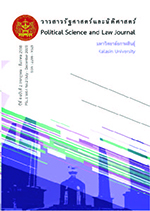ปัจจัยที่มีอิทธิพลต่อการเข้าสู่ตำแหน่งทางวิชาการของบุคลากร สายวิชาการ มหาวิทยาลัยราชภัฏมหาสารคาม
DOI:
https://doi.org/10.14456/gjl.2015.24คำสำคัญ:
การเข้าสู่ตำแหน่งทางวิชาการ, มหาวิทยาลัยราชภัฏมหาสารคาม, the academic positions accession, Rajabhat Maha Sara Kham Universityบทคัดย่อ
การวิจัยครั้งนี้มีวัตถุประสงค์เพื่อ 1) ศึกษาความคิดเห็นเกี่ยวกับปัจจัยที่มี อิทธิพลต่อการเข้าสู่ตำแหน่งทางวิชาการ 2) วิเคราะห์อิทธิพลปัจจัยที่ส่งผลต่อการเข้า สู่ตำแหน่งทางวิชาการของบุคลากรสายวิชาการ และ 3) ศึกษาแนวทางการส่งเสริม และสนับสนุนบุคลากรสายวิชาการเพื่อเข้าสู่ตำแหน่งทางวิชาการในระดับที่สูงขึ้น กลุ่มตัวอย่างเป็นบุคลากรสายวิชาการ มหาวิทยาลัยราชภัฏมหาสารคาม จำนวน 280 คน ได้มาโดยการสุ่มตัวอย่างแบบแบ่งชั้นภูมิตามคณะที่สังกัด เครื่องมือที่ใช้ในการ เก็บรวบรวมข้อมูลเป็นแบบสอบถามมาตราส่วนประมาณค่า 5 ระดับ แลการ สัมภาษณ์เชิงลึก วิเคราะห์ข้อมูลเชิงปริมาณใช้ ค่าความถี่ ค่าร้อยละ ค่าเฉลี่ย ค่าส่วน เบี่ยงเบนมาตรฐาน และการวิเคราะห์พหุคูณถดถอยเชิงเส้นตรง ส่วนข้อมูลเชิง คุณภาพใช้วิธีการวิเคราะห์เนื้อหา ผลการวิจัยพบว่า1. บุคลากรสายวิชาการ มหาวิทยาลัยราชภัฏมหาสารคามมีความคิดเห็น เกี่ยวกับปัจจัยที่มีอิทธิพลต่อการเข้าสู่ตำแหน่งทางวิชาการ ดังต่อไปนี้ (1) ความมีวินัย และการพัฒนาตนเอง (=4.53) (2) ความผูกพันต่อองค์กร (
=4.52) (3) เจตคติ ต่อวิชาชีพอาจารย์ (
=4.50) (4) แรงจูงใจในการปฏิบัติงาน (
=4.44) (5) นโยบายสนับสนุนการเข้าสู่ตำแหน่งทางวิชาการของมหาวิทยาลัย ( X =4.08) กับ (6) การส่งเสริมและสนับสนุนจากผู้บังคับบัญชาต้นสังกัด (
=4.02) และ (7) แรงกดดัน จากสังคมรอบข้าง (
=2.29) ตามลำดับ
2. การเข้าสู่ตำแหน่งทางวิชาการของบุคลากรสายวิชาการ มหาวิทยาลัย ราชภัฏมหาสารคาม ส่วนใหญ่เป็นผู้กำลังพัฒนา/ผลิตผลงานวิชาการ แต่ยังไม่ได้เข้า โครงการตำแหน่งทางวิชาการ จำนวน 85 คน (42.29%) สนใจตำแหน่งทางวิชาการ แต่ยังไม่ได้ทำอะไรเลย จำนวน 46 คน (22.89%) เข้าโครงการผู้ช่วยศาสตราจารย์ จำนวน 30 คน (14.93%) เป็นผู้ช่วยศาสตราจารย์ จำนวน 13 คน (6.47%) เข้า โครงการรองศาสตราจารย์ จำนวน 11 คน (5.47%) ส่วนปัจจัยที่มีอิทธิพลต่อการเข้า สู่ตำแหน่งทางวิชาการของบุคลากรสายวิชาการ อย่างมีนัยสำคัญทางสถิติที่ระดับ 0.05 ได้แก่ เงินเดือน ระดับการศึกษา อายุราชการ และ เพศ โดยตัวแปรดังกล่าว สามารถพยากรณ์ความแปรปรวนของการเข้าสู่ตำแหน่งทางวิชาการได้ร้อยละ 33.60 (R2=0.336, F=24.797)
3. แนวทางการส่งเสริมและสนับสนุนบุคลากรสายวิชาการเพื่อเข้าสู่ ตำแหน่งทางวิชาการในระดับที่สูงขึ้นมี 2 ปัจจัยหลัก ดังนี้ (1) ด้านผู้ขอตำแหน่งทาง วิชาการ มูลเหตุที่สำคัญที่จะผลักดันบุคลากรเข้าสู่ตำแหน่งทางวิชาการ ได้แก่ แรง บันดาลใจของบุคลากร ความเข้าใจถึงกลไกการเข้าสู่ตำแหน่งทางวิชาการ ความกล้าที่ จะยื่นขอตำแหน่งทางวิชาการ ความสามารถในการสร้างสรรค์ผลงานวิชาการ และ การวางกลยุทธ์การก้าวเดินเข้าสู่ตำแหน่งทางวิชาการของตนเอง (2) ด้านหน่วยงาน สนับสนุน ควรดำเนินการ โดยการกำหนดกลยุทธ์การส่งเสริมและสนับสนุนที่มุ่งเน้น ผลลัพธ์ และพัฒนาระบบกลไกสนับสนุน เช่น ระบบพี่เลี้ยง ระบบการเสริมแรง เป็น ต้น รวมทั้งการกำหนดมาตรการการกดดัน เช่น การสร้างแรงกดดันทางการบริหาร หรือทางสังคม เป็นต้นว่ากำหนดระยะเวลาของการเข้าสู่ตำแหน่งทางวิชาการ ซึ่งอาจ จัดทำในรูปแบบเส้นทางความก้าวหน้าในการประกอบอาชีพ โดยการบูรณาการเข้า กับการประเมินศักยภาพการปฏิบัติงานของบุคลากร
This research aimed 1) to study the personnel’s opinion about factors influence the academic positions accession, 2) to analyze the factors influence the academic positions accession, and 3) to study the approach for supporting the personnel access the academic positions. The sample was 280 academic personnel working at Rajabhat Maha Sara Kham University; they were selected by the stratified random sampling. The instruments were the rating scale questionnaire and the interview. The quantitative data was analyzed by frequency, percentage, mean, standard deviation and multiple regression analysis, using the content analysis for analysis the qualitative data. The research results were found as follows;
1. The personnel’s opinion about factors influence the academic positions accession namely; (1) the discipline and self-development (=4.53), (2) the personnel’s engagement (
=4.52), (3) attitude towards the professional (
=4.50), (3) the working motivation (
=4.44), (5) the supporting policy of University (
=4.08), (6) the promotion and supporting from superiors (
=4.02), and (7) the social pressure (
=2.29) respectively.
2. The academic positions accession of personnel of Rajabhat Maha Sara Kham University found that most of them are developing/producing the academic performance but they have not enroll the academic position project for 85 person (42.29%), 46 persons (22.89%) was interesting in the academic position but have not done anything yet, 30 persons(14.93%) joined the program of Assistant Professor, they are Assistant Professor for 13 persons (6.47%), and joined the program of Associated Professor 11 persons (5.47%) respectively. In addition, the factors influence the academic positions accession by statistical significant at .05 levels were the salary, the education level, the working experience and the gender; those variable could predict the academic positions accession of personnel for 33.60% (R2=0.336, F=24.797).
3. The approach for supporting the personnel access the academic positions of Rajabhat Maha Sara Kham University found that; (1) concerning the personnel themselves, the major reason to push personnel access the academic positions were; the privacy inspired, the understanding about academic positions system, the courage to apply for academic positions, the ability to create an academic performance, and the strategy to access the academic positions. (2) The supporting organization; should provide the strategy based on results, they should have the positive strategy such as the mentor system and/or the reinforcement system etc. Moreover, the negative strategy for example to put pressure on the administration or social such as provide the timing for accessing an academic position which may prepared in the career path of personnel and integrated to be the performance evaluation.
Downloads
ดาวน์โหลด
เผยแพร่แล้ว
รูปแบบการอ้างอิง
ฉบับ
ประเภทบทความ
สัญญาอนุญาต
ลิขสิทธิ์ (c) 2017 วารสารการบริหารปกครอง (Governance Journal)

อนุญาตภายใต้เงื่อนไข Creative Commons Attribution-NonCommercial-NoDerivatives 4.0 International License.








